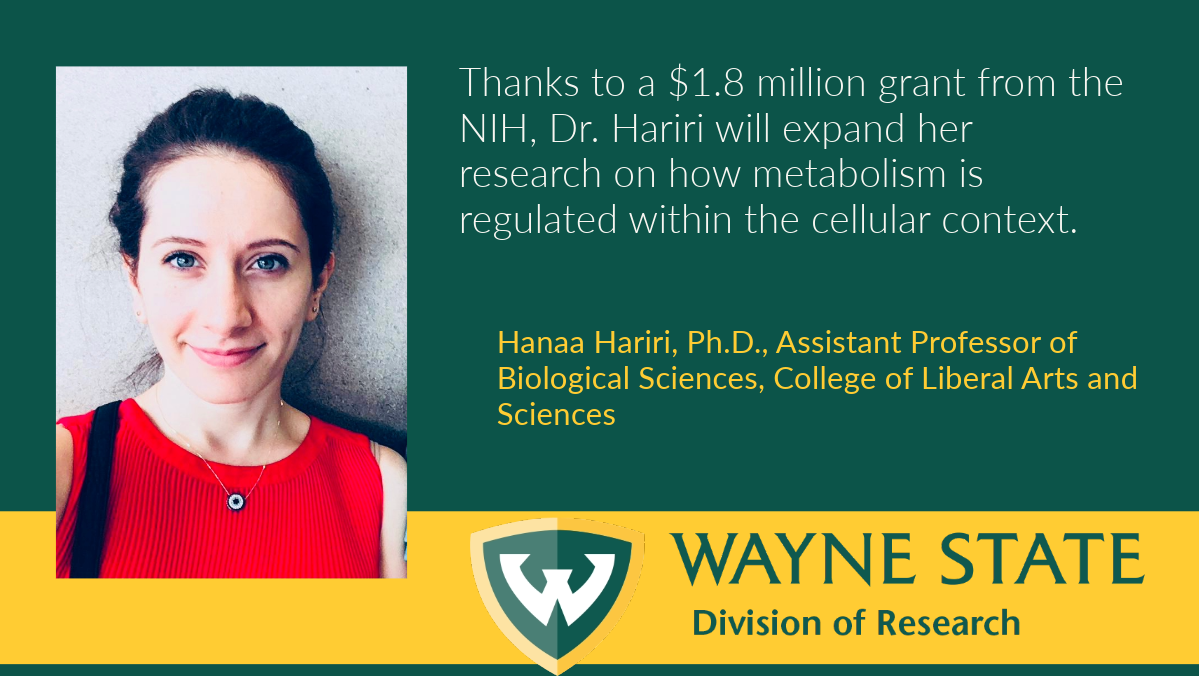NIH awards $1.8M to Wayne State to expand research to unravel new pathways for metabolic regulation

DETROIT – Wayne State University assistant professor of biological sciences Hanaa Hariri, Ph.D., is interested in understanding how cells rewire their metabolic networks to enable adaptation to external perturbations and environmental stress. She will be able to expand her research program, thanks to a five-year National Institute of General Medical Sciences of the National Institutes of Health (NIH) grant with an anticipated total of more than $1.8 million.
“This grant is an important achievement for us because it will allow us to run a logistics program that we intended to have from the beginning,” Hariri said. “Expanding the number of people in the lab will make a big impact on our research. We’re excited for the next five years and what opportunities this will bring.”
Hariri started at Wayne State in January 2021 and said one of the reasons she chose to come to the university was because of the students. She currently works with three graduate students and, with the help of the grant, will now be looking to add more graduate students and several undergraduates to her team.
“One of the things that I really enjoy at Wayne State is working with students of all levels,” Hariri said. “I teach Introduction to Cell Biology to first- and second-year students. This provides an opportunity for me to meet and recruit undergraduates who are interested in research and able to commit the time. I have nothing but positive things to say about the undergraduate students I’ve worked with.”
Hariri said her lab is a great place for student from all educational levels to explore research. Hariri’s lab uses model organisms like baker’s yeast and fruit flies to study fundamental biochemical and metabolic pathways that are highly conserved in humans and across evolution.
“My lab is focused on understanding how organelles inside our cells communicate with each other and how this affects the distribution of nutrients and metabolites within the cell,” Hariri said.
“For a long time, we thought that organelles were isolated entities that perform separate functions. But now we know that they are actually physically connected by what we call protein tethers, and these tethers play important roles in transporting materials efficiently between the organelles,” Hariri added.
“Our primary goal is to dissect how these tethers function on a molecular level. The next big goal would be to explore how disruption of these organelle networks can affect certain cellular and metabolic functions and contribute to diseases. This research will provide a new fundamental understanding of how metabolism is regulated within the cellular context.”
Metabolism is tied to many human disorders like obesity, diabetes, cardiovascular disease and many types of cancer. Hariri’s research aims to unravel new pathways for metabolic regulation in hopes of identifying new molecular targets with therapeutic potential.
The grant number for this NIH project, “Subcellular mechanisms coupling lipid synthesis and methionine metabolism,” is R35GM150892.
###
About Wayne State University
Wayne State University is one of the nation’s pre-eminent public research universities in an urban setting. Through its multidisciplinary approach to research and education, and its ongoing collaboration with government, industry and other institutions, the university seeks to enhance economic growth and improve the quality of life in the city of Detroit, state of Michigan and throughout the world. For more information about research at Wayne State University, visit research.wayne.edu.
Contact info
Julie O'Connor
Director, Research Communications
Phone: 313-577-8845
Email: julie.oconnor@wayne.edu